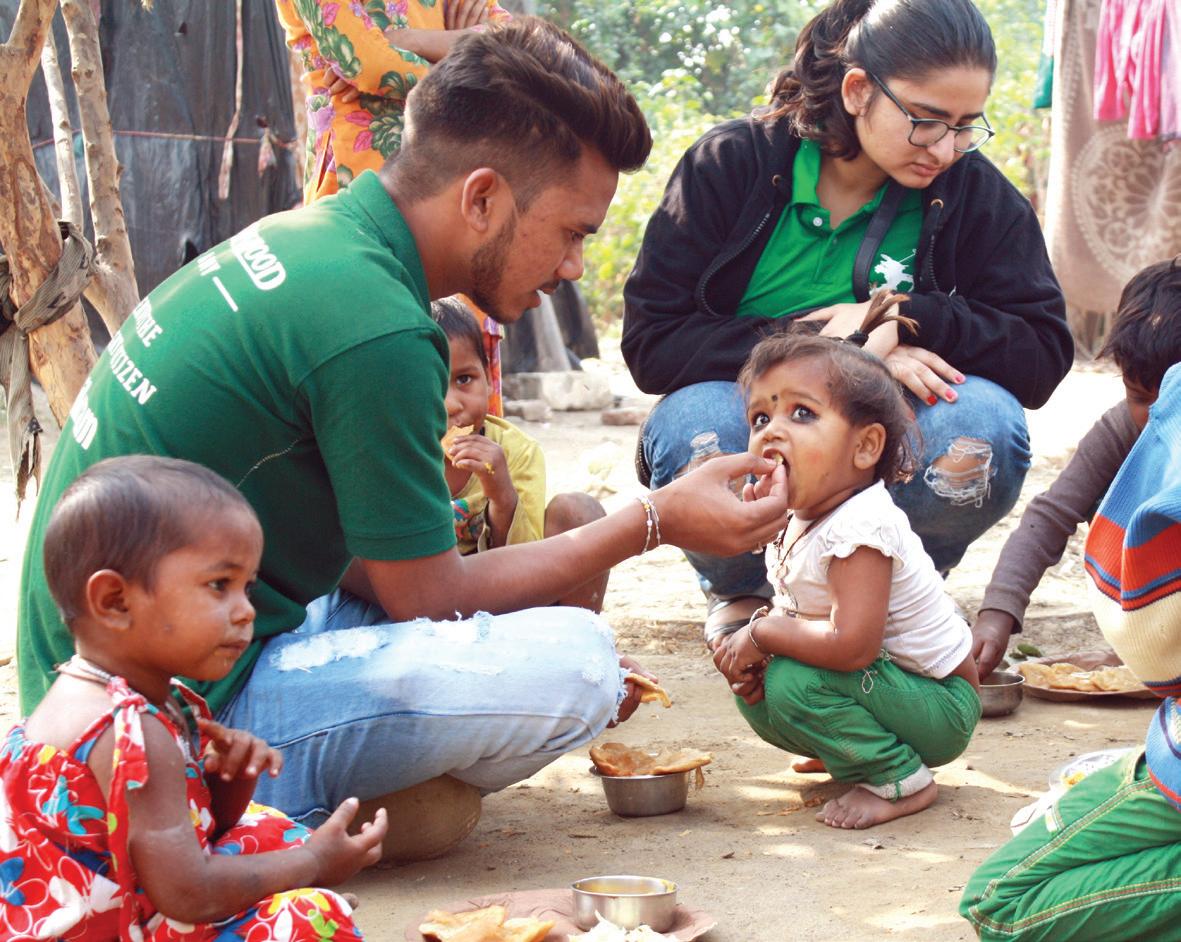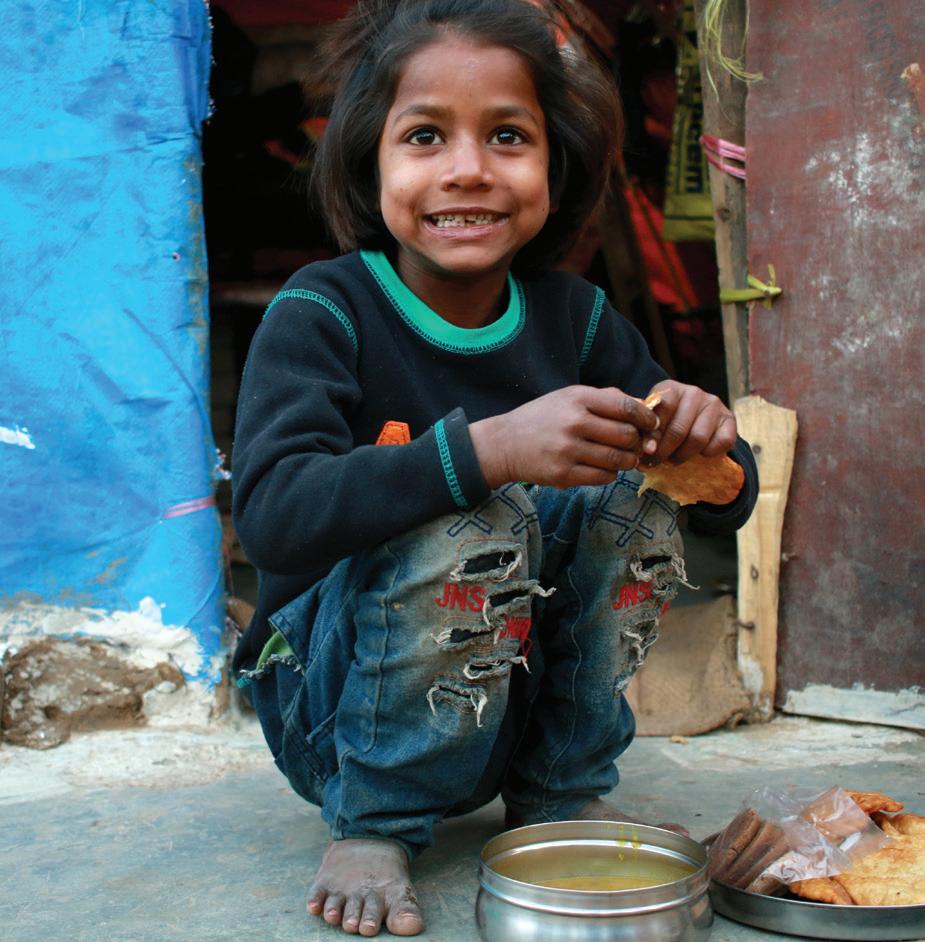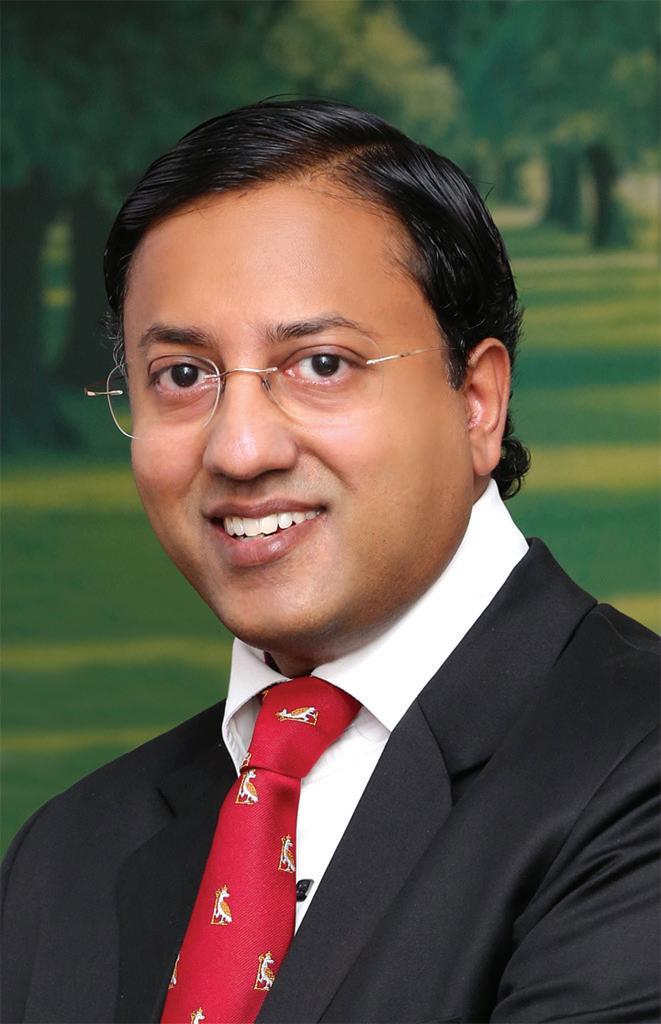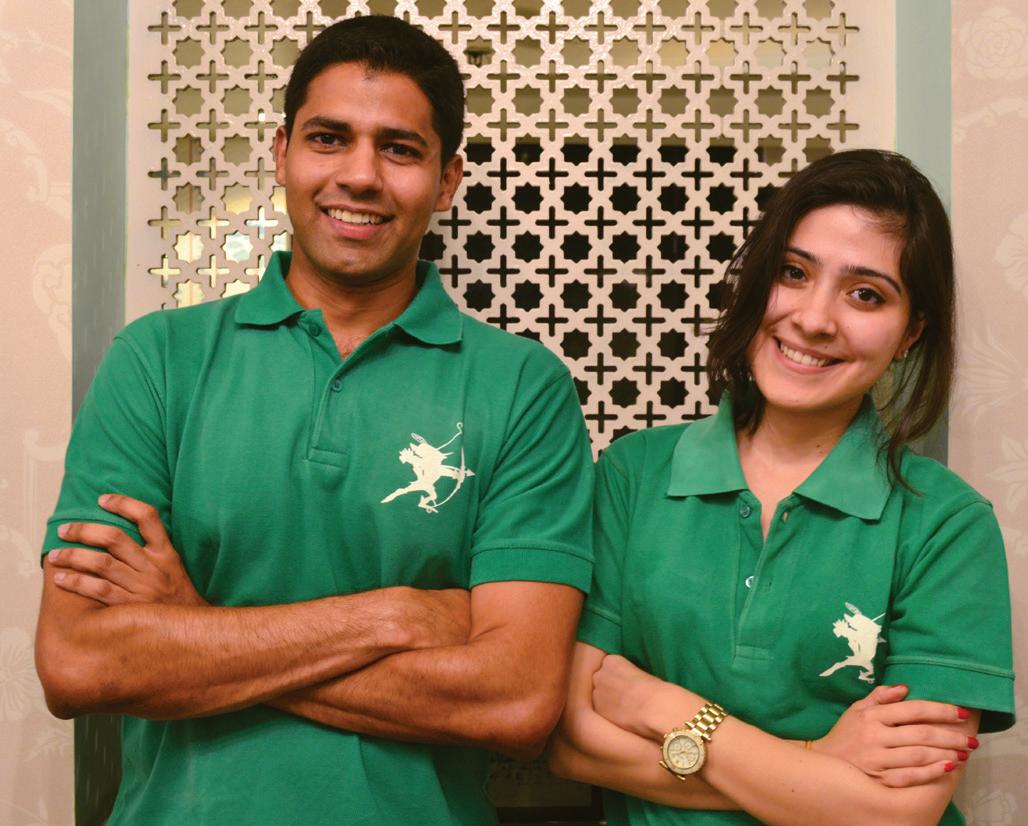
8 minute read
MAKING A DIFFERENCE The Robin Hood Army project is based on a simple principle—why not source surplus food from restaurants and feed the homeless
Kameshwari has become eloquent and vocal about the importance of regular breast screenings with the women she interacts with in her work as a research consultant
who gets riled up about the secrecy surrounding cancer. “There is an unspoken taboo about cancer, especially breast cancer, I felt. I called up my siblings, my friends and sister-in-laws and told them about my prognosis. I guess that was me, I wanted to talk about it maybe because it helped me. But then, I realised after I shared that I had cancer with them they told me of cases in their family that I had not known about earlier,” she points out. In fact, this cancer conqueror says that patients should never hesitate to share their fears and concerns. “Talking helps in overcoming anxieties; reach Kameshwari put him in touch with the project-incharge at the Society for Elimination of Rural Poverty (SERP) and Dr Raghu Ram actively set the wheels in motion. This led to a largescale population-based breast cancer screening programme, in which healthcare workers trained under the auspices of UBF conducted Clinical Breast Examination (CBE) to detect cancer in early stages amongst women aged between 35 – 65 years. So, between 20122016, over 200,000 women spread across 4,000 villages in Telangana and Andhra Pradesh were screened for early signs of breast cancer and those diagnosed with breast cancer were treated free of cost through the government funded Arogyasree scheme.
Advertisement
out to a friend or family member,” she suggests. But, she advises against tapping the Internet for information because it can damage one’s psyche and emotional wellbeing. Kameshwari did not change her diet in any significant way either. Many of her friends working with her on women’s health issues gave her plenty of suggestions. She had just reduced her dairy and sugar intake which she had found difficult. “I have not given them up completely but I take them in moderation. As a vegetarian, I had to ensure to include sufficient protein in my diet and started to have an egg fairly frequently. That is again something that was not so easy to adapt to,” she reveals. In her interaction with Dr Raghu Ram, she had discussed the work she had done with rural women as a consultant with the education ministry. So, one thing led to another and they discussed the possibility of the Ushalakshmi Breast Cancer Foundation (UBF) raising awareness about the importance of early detection of breast cancer and conducting a screening programme for under-privileged women in rural areas, utilising the services of government healthcare workers. Kameshwari has become eloquent and vocal about the importance of regular breast screenings with the women she interacts with in her work as a research consultant.
“The battle is more than half won, when women are mindful and make a conscious effort to look after their health,” she says. Kameshwari knows what she is talking about in more ways than one.
Kameshwari’s three coping mechanisms to fight cancer
• Strong family support. This is crucial as it helps to know that no matter what, you have your close ones to hold your hand and just be there • Mental fortitude and the self-belief that one can overcome. This is the most difficult but do not be ashamed of being fearful or worried. You need to believe that you can battle, overcome and move ahead in life. You need to strongly cling on to this belief because the mind can and does influence how we cope.
You can be your own healer • Do not give up on one’s passions and work is equally crucial. Getting back to normalcy as fast as possible is the best step forward. I have found it is important not to wallow in self-pity and feel that one’s world has crashed. Household routines and chores, immersing oneself in whatever work one does, and being quite open helps immeasurably
The Modern Day
Robin Hoods
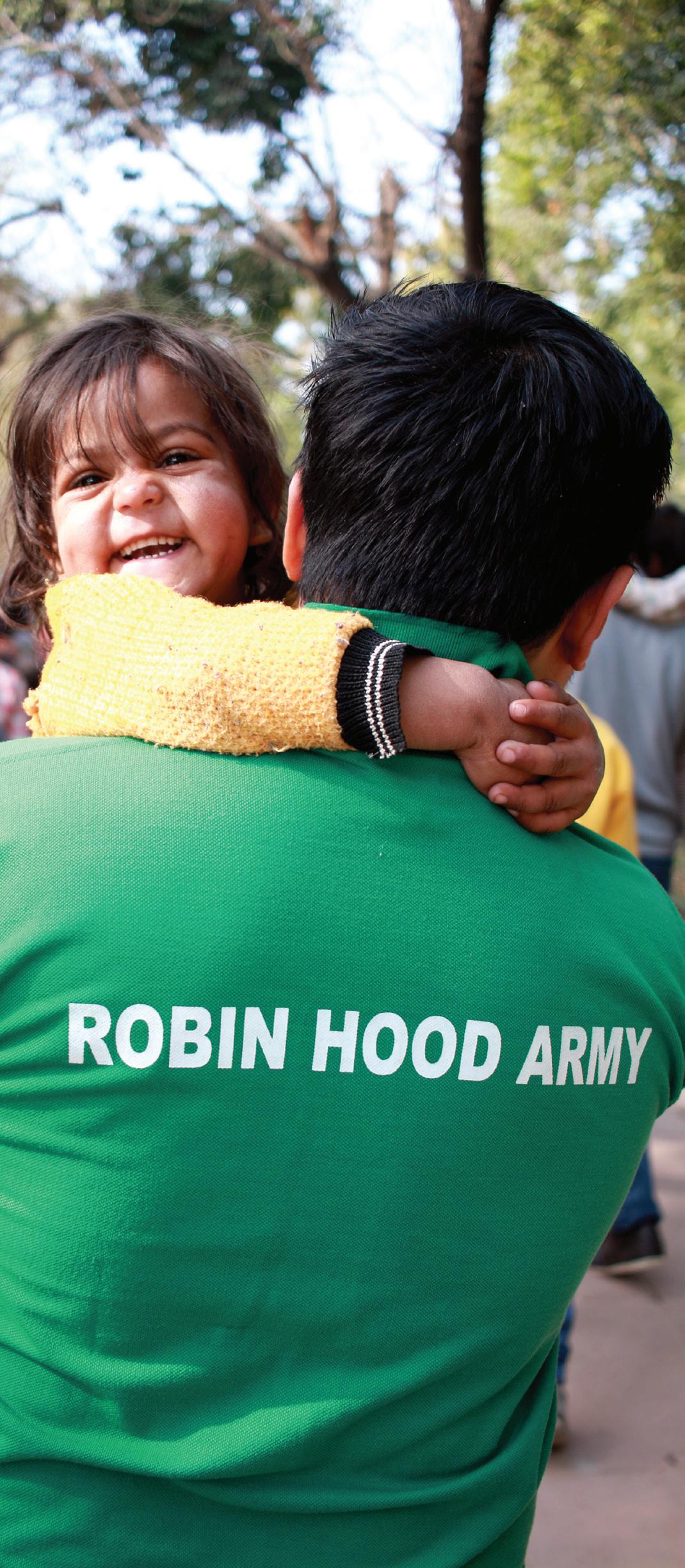
Inspired by a Re-Food programme in Portugal, the Robin Hood Army project was launched in New Delhi by Neel Ghosh, Aarushi Batra and Anand Sinha to feed the homeless with food waste we generate. This volunteer-based organisation that works to source surplus food from restaurants and weddings and feed the less fortunate has rapidly grown across India, and has been playing a critical role during the COVID-19 pandemic. Nivedita Choudhuri talks to the founders about their philosophy and how they reach out to the needy
Robin Hood, the legendary outlaw of English folklore, would rob the rich and give to the poor. That was many centuries ago when King John ruled over England. Plucking a feather out of the hats of Robin Hood and his band of Merry Men, 21st century ‘Robins’ – volunteers this time, not outlaws – scour our cities day and night. But, it’s not silver pennies and gold coins they are after but they are searching for surplus food which they can take from the rich to feed the poor. The statistics are alarming. Hunger reportedly kills more people each year than AIDS, terrorism and malaria. There are around 850 million people in the world who don’t have enough food to feed themselves, according to Robin Hood Army (RHA). Clearly, something had to be done to find a solution to this colossal problem. Inspired by the Re-Food programme in Portugal, a country where RHA co-founder Neel Ghose had lived for some time, the organisation started operating first in New Delhi in August 2014. Enamoured by how simple and doable the idea was, he decided to replicate it in India. Its purpose was simple: source leftover food that was still edible from restaurants and
communities and distribute it to the homeless, hungry and poor on the streets of Delhi. Ghose and his co-founder, Anand Sinha, (they were three of them, including Aarushi Batra, who set up RHA) identified around 150 people who would otherwise go to bed hungry and the first food-distribution drive was carried out by five volunteers.
Today, the RHA has spread to 10 countries, including Pakistan, Nepal, Sri Lanka, Bahrain, Philippines and Malaysia. “In a little over six years, we have managed to make our presence felt in 217 cities and served around 65 million meals,” says Sanchit Jain, a computer engineer, who has his own tech start-up and is a fulltime ‘Robin’.
The RHA is a zero-funds volunteer body. It has no revenue, office space or employees. The ‘Robins’ or volunteers, who are largely students and professionals, help by giving their time for this worthy cause. They are motivated by just one goal: to contribute and do something for society.
Says Batra, “The RHA is a massive team effort involving around 50,000 volunteers who have signed up on our roster and they each put in at least two hours every week to feed the destitute. The modus operandi is simple. The ‘Robins’ use Facebook, Instagram and WhatsApp to attract more volunteers. The food is also sourced from parties, weddings and restaurants using social media. People can also fill in a form on the RHA website (robinhoodarmy.com) to join as a volunteer or to share food.”
Batra, who did her schooling at Convent of Jesus and Mary and then graduated in economics at Jesus & Mary College, New Delhi, met Ghose while both were students of London School of Economics and Political Science. She shifted to New York after her marriage in 2019, but RHA continues to be an invaluable part of her life. Batra says that whenever a drive is planned in a new city, a WhatsApp group is set up connecting all volunteers in that city. New volunteers are continually added to the group. She goes on to explain how Sundays are usually kept aside for drives, but ad-hoc drives also take place. “A decentralised approach is adopted and the founders are usually not involved in the nittygritty and planning that goes into organising drives in the various cities. There are city heads for that,” she says. Batra recalls an instance when 1,000 people were served food left over from only one wedding in Surat. The kind of food wastage at lavish Indian weddings is heart-rending, she says, especially when millions of children in the country sleep hungry every night. “The ‘Robins’ also learn and are motivated by what they see. Ours is not just a food delivery service. We spend time with the underprivileged and needy in hospitals, orphanages and old-age homes and learn so much from them. I have found some of the most positive and jovial people living on streets and under flyovers,” observes Batra. Of course, last year changed everything. Life came to a grinding halt following the pandemic and the subsequent lockdown. Poverty and hunger were pressing issues that existed from before, but the migrant exodus and job losses that followed made life miserable and unbearable for a lot of people in India.
In an effort to mitigate the suffering of people impacted by the pandemic, RHA launched its ‘Mission 30 Million’, which has turned out to be one of the largest food relief efforts in
